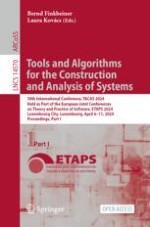Open Access 2024 | Open Access | Buch

Tools and Algorithms for the Construction and Analysis of Systems
30th International Conference, TACAS 2024, Held as Part of the European Joint Conferences on Theory and Practice of Software, ETAPS 2024, Luxembourg City, Luxembourg, April 6–11, 2024, Proceedings, Part I
herausgegeben von: Bernd Finkbeiner, Laura Kovács
Verlag: Springer Nature Switzerland
Buchreihe : Lecture Notes in Computer Science
 ) using the KeY program verification system. As
) using the KeY program verification system. As
 is one of the fastest general purpose sorting algorithms, this is an important step towards a collection of basic toolbox components that are both provably correct and highly efficient. At the same time, it is an important case study of how careful, highly efficient implementations of complicated algorithms can be formally verified directly. We provide an analysis of which features of the KeY system and its verification calculus are instrumental in enabling algorithm verification without any compromise on algorithm efficiency.
is one of the fastest general purpose sorting algorithms, this is an important step towards a collection of basic toolbox components that are both provably correct and highly efficient. At the same time, it is an important case study of how careful, highly efficient implementations of complicated algorithms can be formally verified directly. We provide an analysis of which features of the KeY system and its verification calculus are instrumental in enabling algorithm verification without any compromise on algorithm efficiency.